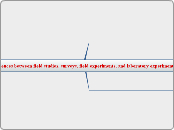Differences between field studies, surveys, field experiments, and laboratory experiments
Field Experiments
Subtopic
Field Studies:
Used when there is limited knowledge of relationship between variables
Exploratory research - trying to gather information, may or may not interact with respondent
Ex Post Facto in design - Researchers do not manipulate or control independent variable
Lacks control, can be hard to interpret, can become infeasible because of cost and time
Conducted in a realistic setting
i.e. - when studying the organizational climate and its effect on job satisfaction in a business settings, field studies would be used to attempt to identify what variables employees consider to be an important measure of job satisfaction
i.e. - Surveys could be used to study an organization’s climate and its effect on job satisfaction, by designing a survey to give to employees at businesses where there appears to be high job satisfaction, and also to employees at businesses where there appears to be low job satisfaction. Asking questions around what job satisfaction means to the employee, what in the organizations climate make them more satisfied with their job, etc.
Laboratory Experiments
Surveys
Researchers need some knowledge of of problem before survey can be designed
Requires interaction with respondent
Ex Post Facto in design - researchers do not manipulate or control independent variable
designed as a search for relationships
provides descriptive research
i.e. - Surveys could be used to study an organization’s climate and its effect on job satisfaction, by designing a survey to give to employees at businesses where there appears to be high job satisfaction, and also to employees at businesses where there appears to be low job satisfaction. Asking questions around what job satisfaction means to the employee, what in the organizations climate make them more satisfied with their job, etc.
